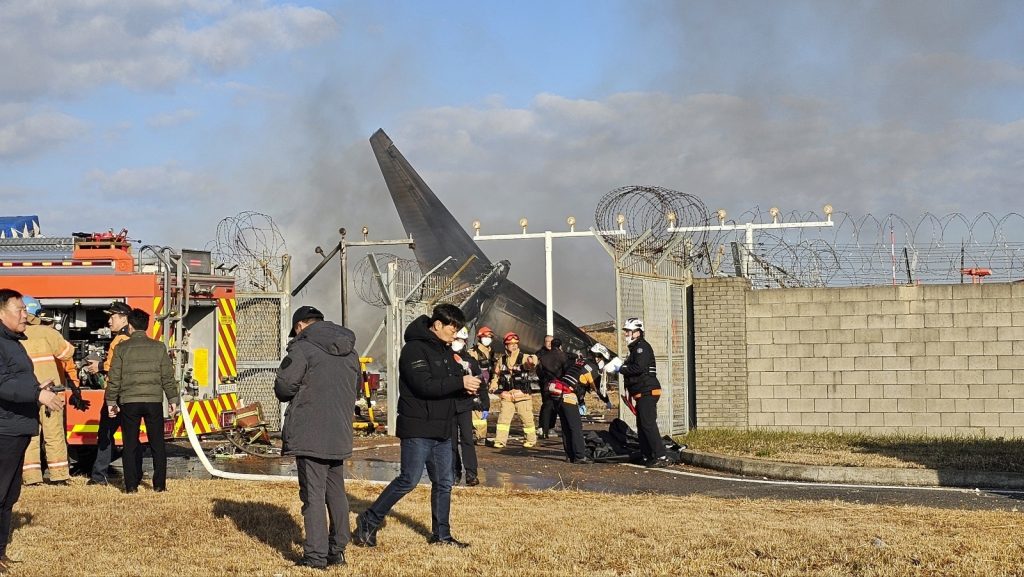Tragedy at Muan International Airport: A Jeju Air Passenger Plane Crashes, Claiming Lives and Raising Concerns
A devastating aviation accident unfolded at Muan International Airport in South Korea on Sunday, December 28, 2024, when a Jeju Air passenger plane carrying approximately 181 individuals crashed and caught fire upon landing. The aircraft, returning from Bangkok, veered off the runway and collided with a fence, resulting in a significant loss of life. Early reports indicate at least 85 fatalities, though the exact number remains subject to confirmation as rescue and recovery efforts continue. The incident has sent shockwaves throughout South Korea, casting a somber pall over the nation during a period of intense political transition.
The disaster struck amidst a backdrop of significant political upheaval in South Korea. President Yoon Suk Yeol’s recent declaration of martial law, followed by the impeachment of Acting President Han Duck-soo, has created a volatile political landscape. Deputy Prime Minister Choi Sang-mok has assumed leadership responsibilities in the wake of these dramatic events, adding another layer of complexity to the response to this tragic accident. The crash and its aftermath present a formidable challenge for the newly installed leadership, requiring a swift and decisive response to address the immediate crisis and its long-term implications.
Emergency response teams swiftly mobilized to the crash site, battling the flames that engulfed the aircraft and working tirelessly to evacuate survivors. Firefighters, paramedics, and other emergency personnel converged on the scene, deploying fire trucks, helicopters, and other resources to contain the blaze and provide medical assistance. The fire was largely brought under control, allowing rescuers to access the wreckage and extract survivors. Local television footage captured harrowing images of thick black smoke billowing from the burning plane, underscoring the severity of the incident.
While initial reports from South Korean media outlets, including Yonhap news agency and the National Fire Agency, indicate a significant loss of life, the exact number of casualties remains fluid. Emergency workers have confirmed the successful evacuation of at least two passengers, offering a glimmer of hope amidst the tragedy. However, the extent of the devastation suggests that the final death toll may be substantial. Authorities are working diligently to identify the victims and notify their families, a painstaking process that will undoubtedly add to the emotional toll of this disaster.
The cause of the crash remains under investigation. Preliminary reports suggest a potential landing gear malfunction as a contributing factor. Emergency officials are carefully examining all available evidence, including flight data recorders and witness accounts, to determine the precise sequence of events leading to the accident. A thorough and transparent investigation is crucial not only to understand the immediate cause of this tragedy but also to identify any systemic issues that may have contributed to the crash, ensuring greater aviation safety in the future.
Deputy Prime Minister Choi Sang-mok has publicly addressed the nation, expressing his deepest condolences to the victims and their families. He has directed all relevant agencies to prioritize the rescue and recovery efforts, ensuring that all available resources are deployed to assist those affected by the crash. The government’s response will be closely scrutinized in the coming days and weeks, as the nation grapples with the aftermath of this devastating event. The crash serves as a stark reminder of the inherent risks associated with air travel and the importance of stringent safety regulations and robust emergency response protocols.
The investigation into the crash is expected to be complex and multifaceted. Investigators will meticulously analyze the wreckage, examine maintenance records, and interview witnesses, including surviving passengers and crew members, to piece together the events leading up to the accident. The reported landing gear malfunction will be a central focus of the investigation, but other factors, such as weather conditions, pilot performance, and air traffic control procedures, will also be thoroughly scrutinized. The findings of the investigation will be crucial in informing future safety measures and preventing similar tragedies from occurring. The aviation industry, both domestically and internationally, will closely monitor the investigation’s progress and incorporate its recommendations to enhance air travel safety.
The aftermath of the crash will undoubtedly have a profound impact on South Korea, both emotionally and politically. The nation is in mourning, grappling with the loss of life and the trauma experienced by survivors and their families. The political landscape, already turbulent due to the recent imposition of martial law and the impeachment of the acting president, is further complicated by this national tragedy. The government’s response to the crisis, including the management of rescue and recovery efforts, the investigation into the cause of the crash, and the provision of support to victims’ families, will be closely scrutinized. The disaster has the potential to reshape the political discourse in South Korea, influencing public opinion and potentially impacting future policy decisions.
The international community has also expressed its condolences and offered support to South Korea in the wake of the crash. Messages of sympathy and offers of assistance have poured in from governments and international organizations around the world, demonstrating a global sense of solidarity in the face of this tragedy. The crash serves as a reminder of the interconnectedness of the global community and the importance of international cooperation in addressing shared challenges.
The Muan International Airport crash is a stark reminder of the fragility of life and the inherent risks associated with air travel. While aviation safety has significantly improved over the years, accidents like this underscore the importance of continuous vigilance and the need for ongoing efforts to enhance safety protocols. The investigation into the crash will undoubtedly lead to important lessons learned, which will hopefully contribute to preventing similar tragedies from occurring in the future. The memory of the victims will serve as a lasting reminder of the importance of prioritizing safety and ensuring the well-being of all who travel by air.










